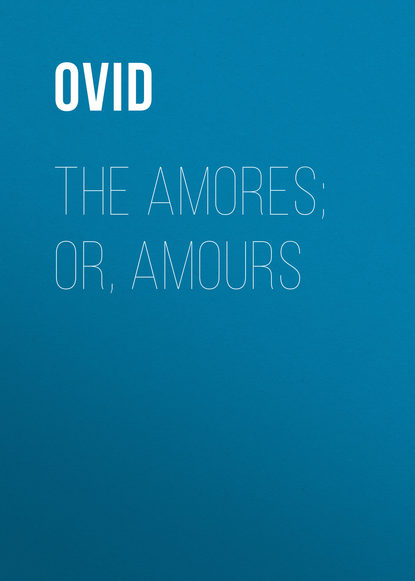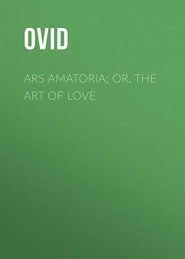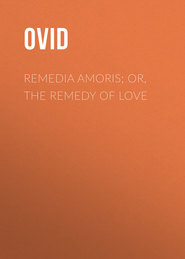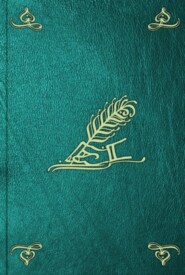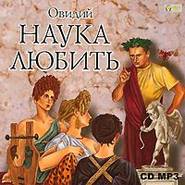По всем вопросам обращайтесь на: info@litportal.ru
(©) 2003-2024.
✖
The Amores; or, Amours
Настройки чтения
Размер шрифта
Высота строк
Поля
Much and long time have I suffered; by your faults is my patience overcome. Depart from my wearied breast, disgraceful Love. In truth I have now liberated myself, and I have burst my chains; and I am ashamed to have borne what it shamed me not to endure. I have conquered; and Love subdued I have trodden under foot; late have the horns 638 (#x10_x_10_i102) come upon my head. Have patience, and endure, 639 (#x10_x_10_i105) this pain will one day avail thee; often has the bitter potion given refreshment to the sick.
And could I then endure, repulsed so oft from thy doors, to lay a free-born body upon the hard ground? 640 (#x10_x_10_i108) And did I then, like a slave, keep watch before thy street door, for some stranger I know not whom, that you were holding in your embrace? And did I behold it, when the wearied paramour came out of your door, carrying off his jaded and exhausted sides? Still, this is more endurable than the fact that I was beheld by him; 641 (#x10_x_10_i111) may that disgrace be the lot of my foes.
When have I not kept close fastened to your side as you walked, 642 (#x10_x_10_i114) myself your keeper, myself your husband, myself your companion? And, celebrated by me forsooth, did you please the public: my passion was the cause of passion in many. Why mention the base perjuries of your perfidious tongue? and why the Gods forsworn 643 (#x10_x_10_i117) for my destruction? Why the silent nods of young men at banquets, 644 (#x10_x_10_i120) and words concealed in signs arranged beforehand? She was reported to me to be ill; headlong and distracted I ran; I arrived; and, to my rival she was not ill. 645 (#x10_x_10_i123)
Bearing these things, and others on which I am silent, I have oft endured them; find another in my stead, who could put up with these things. Now my ship, crowned with the votive chaplet, listens in safety to the swelling waves of the ocean. Cease to lavish your blandishments and the words which once availed; I am not a fool, as once I was. Love on this side, Hatred on that, are struggling, and are dragging my tender heart in opposite directions; but Love, I think, still gets the better. I will hate, 646 (#x10_x_10_i126) if I can; if not, reluctantly will I love; the bull loves not his yoke; still, that which he hates he bears.
I fly from treachery; your beauty, as I fly, brings me back; I abhor the failings of your morals; your person I love. Thus, I can neither live without you, nor yet with you; and I appear to be unacquainted with my own wishes. I wish that either you were less handsome, or less unprincipled. So beauteous a form does not suit morals so bad. Your actions excite hatred; your beauty demands love. Ah wretched me! she is more potent than her frailties.
O pardon me, by the common rites of our bed, by all the Gods who so often allow themselves to be deceived by you, and by your beauty, equal to a great Divinity with me, and by your eyes, which have captivated my own; whatever you shall be, ever shall you be mine; only do you make choice whether you will wish me to wish as well to love you, or whether I am to love you by compulsion. I would rather spread my sails and use propitious gales; since, though I should refuse, I shall still be forced to love.
ELEGY XII
What day was that, on which, ye birds of no white hue, you sent forth your ominous notes, ever sad to me in my loves? Or what star must I consider to be the enemy of my destiny? Or what Deities am I to complain of, as waging war against me? She, who but lately 647 (#x10_x_10_i129) was called my own, whom I commenced alone to love, I fear that with many she must be shared by me.
Am I mistaken? Or has she gained fame by my poems? 'Tis so; by my genius has she been made public. And justly; for why have I made proclamation 648 (#x10_x_10_i132) of her charms? Through my fault has the fair been put up for sale. She pleases, and I the procurer; by my guidance is the lover introduced; by my hands has her door been opened. Whether verses are of any use, is matter of doubt; at all events, they have injured me; they have been envious of my happiness. While Thebes, 649 (#x10_x_10_i135) while Troy, while the exploits of Caesar existed; Corinna alone warmed my genius. Would that I had meddled with verses against the will of the Muses; and that Phoebus had deserted the work commenced! And yet, it is not the custom to listen to Poets as witnesses; 650 (#x10_x_10_i138) I would have preferred all weight to be wanting to my words.
Through us, Scylla, who robbed her father of his white hair, bears the raging dogs 651 (#x10_x_10_i141) beneath her thigh and loins. We have given wings to the feet, serpents to the hair; the victorious descendant of Abas 652 (#x10_x_10_i144) is borne upon the winged steed. We, too, have extended Tityus 653 (#x10_x_10_i147) over the vast space, and have formed the three mouths for the dog bristling -with snakes. We have described Enceladus, 654 (#x10_x_10_i150) hurling with his thousand arms; and the heroes captivated by the voice of the two-shaped damsels. 655 (#x10_x_10_i153) In the Ithacan bags 656 (#x10_x_10_i156) have we enclosed the winds of Æolus; the treacherous Tantalus thirsts in the middle of the stream. Of Niobe we have made the rock, of the damsel, the she-bear; the Cecropian 657 (#x10_x_10_i159) bird sings of Odrysian Itys. Jupiter transforms himself, either into a bird, or into gold 658 (#x10_x_10_i162) or, as a bull, with the virgin placed upon him, he cleaves the waves. Why mention Proteus, and the Theban seed, 659 (#x10_x_10_i165) the teeth? Why that there were bulls, which vomited flames from their mouths? Why, charioteer, that thy sisters distil amber tears? 660 (#x10_x_10_i168) Why that they are now Goddesses of the sea, who once were ships? 661 (#x10_x_10_i171) Why that the light of day fled from the hellish banquet 662 (#x10_x_10_i174) of Atreus? And why that the hard stones followed the lyre 663 (#x10_x_10_i177) as it was struck?
The fertile license of the Poets ranges over an immense space; and it ties not its words to the accuracy of history. So, too, ought my mistress to have been deemed to be falsely praised; now is your credulity a mischief to me.
ELEGY XIII
A s my wife was born at Falisci, so fruitful in apples, we repaired to the walls that were conquered, Camillus, by thee. 664 (#x10_x_10_i180) The priestesses were preparing the chaste festival of Juno, with distinguished games, and the heifer of the country. 'Twas a great remuneration for my stay, to be acquainted with the ceremony; although a path, difficult from the ascent, leads the way thither. There stands a grove, ancient, and shaded with numberless trees; look at it, you must confess that a Divinity exists in the spot. An altar receives the prayers, and the votive incense of the pious; an altar made without skill, by ancient hands.
When, from this spot, the pipe has given the signal with its usual note, the yearly procession moves along the covered paths. 665 (#x10_x_10_i183) Snow-white heifers 666 (#x10_x_10_i186) are led, as the crowd applauds, which the Faliscan grass has fed on its own plains; calves, too, not yet threatening with the forehead to inspire fear; and the pig, a smaller victim, from its lowly sty; the leader too, of the flock, with his horns bending back over his hardy temples; the goat alone is odious to the Goddess queen. By her betrayal, discovered in the lofty woods, 667 (#x10_x_10_i189) she is said to have desisted from the flight she had commenced. Even now, by the boys, is she aimed at as a mark; 668 (#x10_x_10_i192) and she is given, as a prize, to the author of her wound. Where the Goddess is to come, the youths and bashful girls sweep the roads before her, with garments 669 (#x10_x_10_i195) as they lie. Their virgin hair is adorned with gold and gems; and the proud mantle conceals their feet, bedecked with gold. After the Grecian manner 670 (#x10_x_10_i198) of their ancestors, clad in white garments, they bear the sacred vessels entrusted to them on their heads, placed beneath. The people hold religious silence, 671 (#x10_x_10_i201) at the moment when the resplendent procession comes up; and she herself follows after her priestesses.
Argive is the appearance of the procession; Agamemnon slain, Halesus 672 (#x10_x_10_i204) fled from both his crime and his father's wealth. And now, an exile, having wandered over both land and sea, he erected lofty walls with prospering hand. He taught his own Falisci the rites of Juno. May they be ever propitious to myself, may they be ever so to her own people.
ELEGY XIV
Beauteous since you are, I do not forbid your being frail; but let it not be a matter of course, that wretched I should know it. Nor does any severity of mine command you to be quite correct; but it only entreats you to try to conceal the truth. She is not culpable, whoever can deny that she has been culpable; and 'tis only the confession of error that makes a woman disgraced. What madness is it to confess in light of day what lies concealed in night? And what you do in secret, to say openly that it is done? The strumpet about to entertain some obscure Roman, first keeps out the public by fastening up the bar. And will you make known your frailties to malicious report? And will you make proof of your own criminality? May your mind be more sound, or, at least, may you imitate the chaste; and although you are not, let me suppose that you are chaste. What you do, still do the same; only deny that you do so; and be not ashamed in public to speak the language of chastity. There is the occasion which demands wantonness; sate it with every delight; far thence be all modesty. Soon as you take your departure thence; away at once with all lasciviousness, and leave your frailties in your chamber
Illic nec tunicam tibi sit posuisse rubori,
Nec femori impositum sustinuisse femur:
Illic purpureis condatur lingua labellis:
Inque modos Venerem mille figuret amor;
Illic nec voces, nec verba juvantia cessent;
Spondaque lascivâ mobilitate tremat.
With your garments put on looks that dread accusation; and let modesty disavow improper pursuits. Deceive the public, deceive me, too; in my ignorance, let me be mistaken, and allow me to enjoy my silly credulity.
Why do I so often espy letters sent and received? Why one side and the other 673 (#x10_x_10_i207) tumbled, of your couch? Why do I see your hair disarranged more than happens in sleep, and your neck bearing the marks of teeth? The fading itself alone you do not bring before my eyes; if you hesitate consulting your own reputation, still, spare me. My senses fail me, and I am expiring, oft as you confess your failings; and the drops flow, chilled throughout my limbs. Then do I love you; then, in vain, do I hate what I am forced to love; 673* then I could wish myself to be dead, but together with you.
No enquiries, for my part, will I make, nor will I try to know what you shall attempt to conceal; and to me it shall be the same as a false charge. If, however, you shall be found detected in the midst of your guilt, and if criminality shall be beheld by my eyes; what has been plainly seen, do you deny to have been plainly seen; my own eyes shall give way to your assertions.'Tis an easy conquest for you to vanquish me, who desire to be vanquished. Let your tongue only be mindful to say—"I did not do it!" since it is your lot to conquer with two words; although not by the merit of your cause, still conquer through your judge.
ELEGY X
Seek a new Poet, mother of the tender Loves; here the extreme turning-place is grazed 674 (#x10_x_10_i210) by my Elegies, which I, a foster-child of the Pelignian fields, have composed; nor have my sportive lays disgraced me. Me, I say, who, if that is aught, am the heir to my rank, 675 (#x10_x_10_i213) even through a long line of ancestors, and not lately made a Knight in the hurly-burly of warfare. Mantua delights in Virgil, Verona in Catullus; I shall be called the glory of the Pelignian race; which its own liberties summon to glorious arms, 676 (#x10_x_10_i216) when trembling Rome dreaded 677 (#x10_x_10_i219) the allied bands. And some stranger will say, as he looks on the walls of the watery Sulmo, which occupy but a few acres of land, "Small as you are, I will call you great, who were able to produce a Poet so great." Beauteous boy, and thou, Amathusian parent 678 (#x10_x_10_i222) of the beauteous boy, raise your golden standard from my fields. The horned 679 (#x10_x_10_i225) Lyæus 680 (#x10_x_10_i228) has struck me with a thyrsus more potent; with mighty steeds must a more extended plain be paced. Unwarlike Elegies, my sportive 681 (#x10_x_10_i231) Muse, farewell; a work destined to survive long after I am dead and gone.–
FOOTNOTES BOOK ONE:
001 (return (#x1_x_1_i81))
[ Were five books.—Ver. 1. From this it is clear, that the first edition which Ovid gave to the public of his 'Amores' was in five Books; but that on revising his work, he preferred (praetulit) these three books to the former five. It is supposed that he rejected many of those Elegies which were of too free a nature and were likely to embroil him with the authorities, by reason of their licentiousness.]
002 (return (#x1_x_1_i81))
[ Though it should.—Ver. 3. Burmann has rightly observed, that 'ut jam,' in this line, has exactly the force of 'quamvis,' 'although.']
003 (return (#x1_x_1_i85))
[ In serious numbers.—Ver. 1. By the 'graves numeri,' he means Heroic or Hexameter verses. It is supposed that he alludes to the battle of the Giants or the Titans, on which subject he had begun to write an heroic poem. In these lines Ovid seems to have had in view the commencement of the first Ode of Anacreon.]
004 (return (#x1_x_1_i85))
[ Suited to the measure.—Ver. 2. The subject being of a grave character, and, as such, suited to Heroic measure.]
005 (return (#x1_x_1_i85))
[ Abstracted one foot.—Ver. 4. He says that every second line (as is the case in Heroic verse) had as many feet as the first, namely, six : but that Cupid stole a foot from the Hexameter, and reduced it to a Pentameter, whereby the Poet was forced to recur to the Elegiac measure.]
008 (return (#x1_x_1_i85))
[ Diminish my energies.—Ver. 18. See the Note to the fourth line.]
009 (return (#x1_x_1_i86))
[ His quiver loosened.—Ver. 21. The 'pharetra,' or quiver, filled with arrows, was used by most of the nations that excelled in archery, among whom were the Scythians, Persians, Lycians, Thracians, and Cretans. It was made of leather, and was sometimes adorned with gold or painting. It had a lid, and was suspended by a belt from the right shoulder. Its usual position was on the left hip, and it was thus worn by the Scythians and Egyptians. The Cretans, however, wore it behind the back, and Diana, in her statues, is represented as so doing. This must have been the method in which Cupid is intended in the present instance to wear it, as he has to unloose the quiver before he takes out the arrow. Some Commentators, however, would have 'solutâ' to refer simply to the act of opening the quiver.]
010 (return (#x1_x_1_i86))
[ In six feet.—Ver. 27. He says that he must henceforth write in Hexameters and Pentameters, or, in other words, in the Elegiac measure.]
011 (return (#x1_x_1_i86))
[ My Muse.—Ver. 30. The Muse addressed by him would be Erato, under whose protection were those Poets whose theme was Love. He bids her wreathe her hair with myrtle, because it was sacred to Venus; while, on the other hand, laurels would be better adapted to the Heroic Muse. The myrtle is said to love the moisture and coolness of the sea-shore.]
014 (return (#x1_x_1_i91))
[ Thy step-father.—Ver. 24. He calls Mars the step-father of Cupid, in consequence of his intrigue with Venus.]
015 (return (#x1_x_1_i91))
[ Birds so yoked.—Ver. 26. These are the doves which were sacred to Venus and Cupid. By yoking them to the chariot of Mars, the Poe* wishes to show the skill and power of Cupid.]
016 (return (#x1_x_1_i91))





